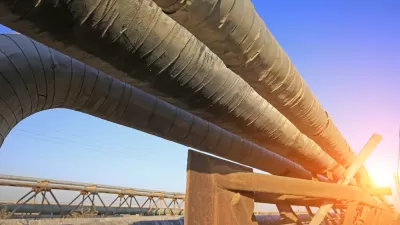The environmental impact statement on the Keystone XL oil pipeline released Friday by the U.S. State Department delivered news that environmentalists will not be happy to hear. The study finds that the project will not exacerbate oil extraction.
By concluding that building the Keystone XL pipeline would not significantly "change the overall development of the [Alberta] oil sands", the Final Supplemental Environmental Impact Statement (SEIS) released by the State Department on Friday removes a major obstacle to approval of the controversial pipeline. Essentially, the report concludes that, "[b]ecause of global demand, the oil will most likely get to market whether or not the pipeline is built," writes Coral Davenport. As Planetizen readers are likely aware, oil delivery by rail has accelerated in the absence of pipeline capacity.
"In a major speech on the environment last summer, Mr. Obama said that he would approve the pipeline only if it would not 'significantly exacerbate' the problem of carbon pollution. He said the pipeline’s net effects on the climate would be 'absolutely critical' to his decision," notes Davenport. "The conclusions of the report appear to indicate that the project has passed Mr. Obama’s climate criteria, an outcome expected to outrage environmentalists, who have rallied, protested, marched and been arrested in demonstrations around the country against the pipeline."
"The report released on Friday, however, is far from the final decision on the project," Davenport adds. The Departments of Defense, Justice, Interior, Commerce, Transportation, Energy and Homeland Security, and the Environmental Protection Agency will all have a chance to comment on the project.
FULL STORY: Report May Ease Way to Approval of Keystone Pipeline

Planetizen Federal Action Tracker
A weekly monitor of how Trump’s orders and actions are impacting planners and planning in America.

Map: Where Senate Republicans Want to Sell Your Public Lands
For public land advocates, the Senate Republicans’ proposal to sell millions of acres of public land in the West is “the biggest fight of their careers.”

Restaurant Patios Were a Pandemic Win — Why Were They so Hard to Keep?
Social distancing requirements and changes in travel patterns prompted cities to pilot new uses for street and sidewalk space. Then it got complicated.

Platform Pilsner: Vancouver Transit Agency Releases... a Beer?
TransLink will receive a portion of every sale of the four-pack.

Toronto Weighs Cheaper Transit, Parking Hikes for Major Events
Special event rates would take effect during large festivals, sports games and concerts to ‘discourage driving, manage congestion and free up space for transit.”

Berlin to Consider Car-Free Zone Larger Than Manhattan
The area bound by the 22-mile Ringbahn would still allow 12 uses of a private automobile per year per person, and several other exemptions.
Urban Design for Planners 1: Software Tools
This six-course series explores essential urban design concepts using open source software and equips planners with the tools they need to participate fully in the urban design process.
Planning for Universal Design
Learn the tools for implementing Universal Design in planning regulations.
Heyer Gruel & Associates PA
JM Goldson LLC
Custer County Colorado
City of Camden Redevelopment Agency
City of Astoria
Transportation Research & Education Center (TREC) at Portland State University
Camden Redevelopment Agency
City of Claremont
Municipality of Princeton (NJ)



























